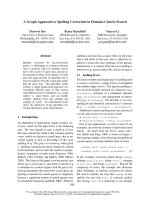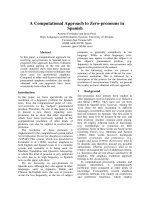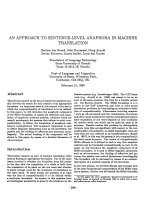Cluster demonstration - An approach to augment productivity in Blackgram
Bạn đang xem bản rút gọn của tài liệu. Xem và tải ngay bản đầy đủ của tài liệu tại đây (196.52 KB, 5 trang )
Int.J.Curr.Microbiol.App.Sci (2019) 8(9): 1352-1356
International Journal of Current Microbiology and Applied Sciences
ISSN: 2319-7706 Volume 8 Number 09 (2019)
Journal homepage:
Original Research Article
/>
Cluster Demonstration- An Approach to Augment
Productivity in Blackgram
G. Porkodi1* and M. Nirmala Devi2
1
2
(SS&AC), Krishi Vigyan Kendra, TNAU, Vridhachalam, India
(Agricultural Extension), AC&RI, TNAU, Vazhavachanur, India
*Corresponding author
ABSTRACT
Keywords
Blackgram,
productivity,
technologies,
FLD and cluster
approach
Article Info
Accepted:
18 August 2019
Available Online:
10 September 2019
Krishi Vigyan Kendra, Cuddalore District intervened with demonstrations on pulses
with cluster approach to increase the production of pulses in Cuddalore district under
NFSM-pulse production scheme. The KVK has conducted 50 front line
demonstrations in farmer’s fields during the year 2015-16 in black gram in an area of
20ha. Front line demonstration is an appropriate means for demonstration as well as
transfer of improved agricultural innovations to the farming community. Two cluster
villages viz., Melpuliankudi and Agrahram of Kattumanarkoil block were selected for
the purpose and the blackgram variety VBN 5 was selected for demonstration. From
the demonstrations, an average yield of 5.20 q ha-1 was recorded as against 4.21 q ha-1
from farmers practice and the maximum yield of 5.91 q ha-1 was noticed and a
quantity of 1120 kg of produce was sold as seed to other farmers in the region.
Obviously, this can be attributed to improved technology as well as improved variety.
The yield levels were considerably low under local practices because of considerable
variations in the extent of adoption of recommended package of practices depending
upon the amount of risk involved in terms of cost, convenience, skill and knowledge
about the concerned practice. The productivity was better over local practice under
demonstrations. Hence, cluster approach in disseminating pulses production
technologies had an efficient impact on productivity of the crop and this may be
considered to be applicable for other crops too.
Introduction
Blackgram is one of the major crops cultivated
in Cuddalore district in an area of 45000 ha
every year. To enhance the blackgram
production and productivity in Cuddalore
district, Front line demonstrations were carried
out as cluster approach by the scientists of
Krishi Vigyan Kendra, KVK, Vridhachalam,
Cuddalore District. Existing Farmers’
practices show less contribution towards
pulses production and develops a divide
between traditional and scientific production
technologies. Constant efforts are needed to
bridge this technological divide through
various methods of transfer of technology.
Over a period of time, a number of improved
pulses varieties and production technologies
have been developed, but full potential of
these varieties as well as technologies could
1352
Int.J.Curr.Microbiol.App.Sci (2019) 8(9): 1352-1356
not be attained due to lack of awareness of the
varieties, low rate of adoption and low yields
of obsoletes varieties, pulses production is
mostly from the crop raised under rainfed
conditions, cultivation of pulses in marginal
lands, limited area of pulses under irrigated
conditions, pests and diseases and processing
loss These factors limiting the productivity
cannot be overlooked. To raise production an
effective way of transfer of technology is
needed. The efforts should be taken with
planning, execution and follow up action of
the pulses production technology through
front line demonstrations, the present
investigation was therefore undertaken to
ascertain the importance of demonstrations in
pulses production technology for increased
yield.
Materials and Methods
The technologies to be demonstrated for
blackgram was identified based on
Participatory
Rural
Appraisal
(PRA)
technique. A group of farmers were identified
based on their participation and feedback
received during the preliminary survey and
interactive meeting. Frontline demonstrations
were conducted by Krishi Vigyan Kendra,
Vridhachalam, Cuddalore District in Rabi
season in the farmer’s fields of cluster villages
viz., Melpuliankudi and Agrahram from
Kattumanarkoil block during 2015-16. All 50
demonstrations in 20 ha area were conducted
by the active participation of farmers with the
objective to demonstrate the improved
technologies of pulses in selected villages
along with farmers practice as control plot.
Pre-sowing trainings were organized involving
the selected farmers in their village for the
crop. Critical inputs were distributed to the
farmers. Supply of necessary literature and
regular visits for monitoring pest and diseases
were made and advisory services were
provided to the demo farmers. Finally, field
day was conducted involving demonstration
holding farmers, other farmers in the village,
officials from Department of Agriculture and
extension functionaries to demonstrate the
success of the technology. Crop yield was
recorded from the demonstration and control
plots.
The yield data were collected from both the
plots of demonstration and farmers practice by
random crop cutting method and analyzed.
The technology gap and technological index
(Samui et al., 2000) were calculated by using
following formula.
Technology gap
= Potential yield – Demonstration yield
Technology Index
Potential Yield-Demonstration Yield X 100
= ______________________________
Potential Yield
Percent increase yield
Demonstration yield - farmers yield X 100
=_________________________________
Farmers yield
Percent increase yield
Demonstration yield - farmers yield X 100
= _________________________________
Farmers yield
Results and Discussion
The data collected with reference to farmers
practice was tabulated against the technology
gap (Table 1)
The demonstration plot was intervened with
the black gram variety VBN 5, seed treatment
with Rhizobium @ 200g per ha of seed and
Pseudomonas fluorescens at 10g kg-1 of seed,
spraying of pulse wonder 5 kg per acre at the
time of flowering and Setting up of yellow
sticky traps @ 5 per acre, setting of
1353
Int.J.Curr.Microbiol.App.Sci (2019) 8(9): 1352-1356
pheromone traps@ 5 per acre. The farmers
were also imparted with trainings on
production technologies of black gram.
Periodical visits were made by the subject
matter specialists of Krishi Vigyan Kendra
and field advisory services on crop
management and crop protection were given.
The demo and check plots were observed and
monitored periodically and the data were
recorded. Field day was organized by inviting
participation of the demo farmers, fellow
farmers and extension officials form the
district. The farmers were encouraged through
the visualizing the results of the demo plot.
Table.1 Differences between technological interventions and farmers practices under FLD on
blackgram
Particulars
Variety
Technological intervention in
FLD
VBN 5
Farmers practices
Local/own seed
Gap
Full gap
Seed rate
Seed treatment
20 kg/ha
25 kg/ha
Rhizobium @ 200g per ha of seed
No seed treatment
Pseudomonas fluorescens at 10g
kg-1 of seed
High seed rate
Full gap
Fertilizer dose
55 Kg of urea, 312 kg of Super
phosphate, 42 kg of potash +
TNAU micronutrient mixture
(MN) at 12.5 kg per ha
spraying of pulse wonder 5 kg per
acre at the time of flowering
Pendimithalin @ 2.5 L/ha and one
hand weeding @ 20 DAS
Setting up of yellow sticky traps @
5 per acre, setting of pheromone
traps@ 5 per acre
Full gap
Growth Regulators
Weed management
Plant protection
No use of fertilizer
No use of growth Full gap
regulators
Pendimithalin @ 2.5 Partial gap
L/ha
Improper measures
Full gap
Table.2 Technical Parameters of blackgram under Frontline Demonstration and farmers practice
(check) during Rabi season (Pooled data)
Demo
No. of
Area
variety
Demos
(ha)
VBN 5
50
20
Yield (q/ha)
Demo
Check
5.20
4.21
% increase
Potential
Technology
Technology
over check
yield (q/ha)
gap (q/ha)
index (%)
23.51
9.00
3.8
42.22
1354
Int.J.Curr.Microbiol.App.Sci (2019) 8(9): 1352-1356
Table.3 Economic Parameters of blackgram under Frontline Demonstration and farmers practice
(check) during Rabi season (Pooled data)
Variety
demonstrated
VBN 5 for 50
demonstration
Farmer’s Existing plot (Check)
Gross
Cost
Gross
return
Net
Return
(Rs/ha)
(Rs/ha)
(Rs/ha)
26150
38678
12528
Demonstration plot
B:C
Ratio
1.48
Gross
Cost
Gross
return
Net
Return
(Rs/ha)
(Rs/ha)
(Rs/ha)
29145
48944
19798
Farmers
feedback
B:C
ratio
1.67
No of pods
per plant is
more than the
farmer
practice
Table.4 Socio-economic impact parameters of blackgram under Frontline Demonstration and
farmers practice (check) during Rabi season
Sl.
No.
1
Crop and
variety
Total
Produce
Demonstrated
Obtained
(kg)
Blackgram
15464
Produce sold
Selling
(kg/househol
d)
Rate
910
(Rs/kg)
96.00
VBN 5
Average yield recorded in blackgram under
rainfed situation was ranged 4.50 to 5.91 q/ha
with an average of 5.20 q/ha in FLD plots
which was more than check plot wherein, the
average of 4.21 q per ha (Table 2). The results
indicated that the frontline demonstrations
gave good impact over the farming
community of Cuddalore district as they were
motivated
by
the
new
agricultural
technologies applied in the FLD plots. The
economics of the Front Line Demonstration
showed that the highest net return (Rs. 19798)
with the B:C ratio of 1.67 when compared
with farmers practice (Rs. 12528) with the
B:C ratio of 1.48 (Table 3).
It is concluded that the FLD programme is an
effective tool for increasing the production
and productivity of pulses and changing the
knowledge, attitude and skill of farmers. Use
Produce
used for
own
sowing
(kg)
Produce
distributed
to other
farmers
(kg)
3750
4500
Purpose for
which
income
gained was
utilized
Livelihood,
Education
purpose
Employme
nt
Generated
(Mandays/
house hold)
22
of improved method of blackgram cultivation
can reduce the technology gap to a
considerable extent thus leading to increase
productivity of blackgram in the district.
Through FLD an average yield of 5.20 q ha-1
was recorded as against 4.21 q ha-1 from
farmers practice and the maximum yield of
5.91 q ha-1 was noticed. These demonstrations
also built the relationship and confidence
between farmers and scientists.
The beneficiary farmers of FLDs also play an
important role as source of information and
quality seeds for wider dissemination and
horizontal spread of the high yielding varieties
of pulses to other farmers. Technology index
which shows the feasibility of the technology
demonstrated has depicted good performance
of the intervention.
1355
Int.J.Curr.Microbiol.App.Sci (2019) 8(9): 1352-1356
References
Samui, S. K., Maitra, S., Roy, D. K., Mandal,
A. K. and Saha, D. (2000). Evaluation
of front line demonstration on
groundnut. J Indian Soc. Coastal
Agric. Res., 18(2): 180-183.
How to cite this article:
Porkodi, G. and Nirmala Devi, M. 2019. Cluster Demonstration- An Approach to Augment
Productivity in Blackgram. Int.J.Curr.Microbiol.App.Sci. 8(09): 1352-1356.
doi: />
1356









